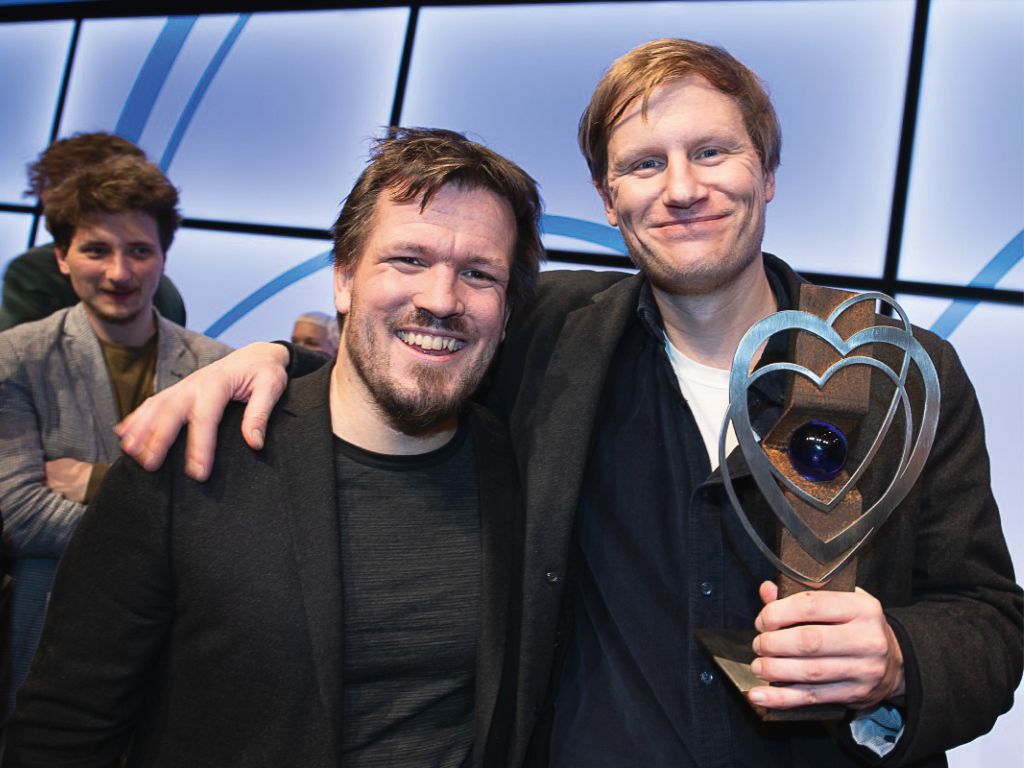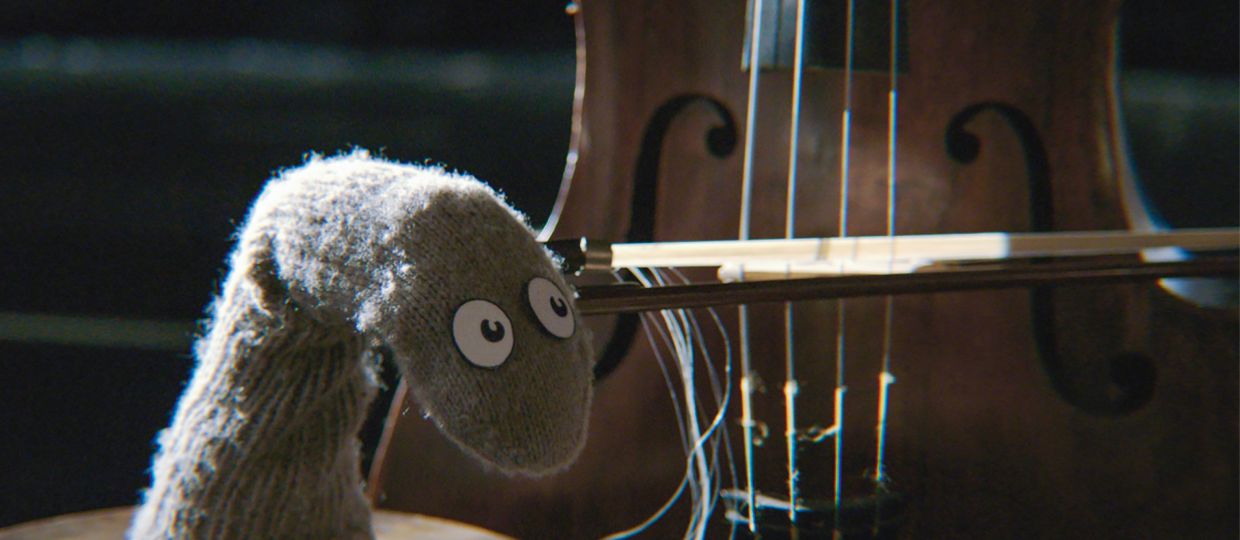Well-tempered is an expression that pops up frequently in conversations with Henning Backhaus. This wouldn’t be surprising if he were a musician, but when a filmmaker uses it, it’s a good bit more noticeable. Nearly all of Backhaus’s output as a director shows just how at home its creator feels in music, as well. “In principle,” says the Dresden native, “a movie is also music—just in pictures.” And his most recent work, the animated film Das beste Orchester der Welt [The World’s Best Orchestra] with Ingbert the Sock (Socke Ingbert) in the lead role, was named Best Short Film early this year at the Max Ophüls Film Festival in Saarbrücken. But more on that later.
The fact that this son of a highly musical family would eventually land at the Film Academy in Vienna and study film directing under Michael Haneke is something that couldn’t necessarily have been predicted. He sang in a boys’ choir from an early age and there was also no television at home, but he did have a thing for thinking out his own movie plots. Later on, Backhaus learned to play piano (albeit without all that much enthusiasm), and he also began collecting film music—a passion he still pursues today. Following graduation from secondary school, he applied to the film schools in Ludwigsburg and Potsdam only to be assigned first place on a waiting list … and was ultimately quite happy indeed that he’d also tried his luck in Vienna. Because even the entrance exam, recalls the filmmaker, was very relaxed compared with how things ran at the German schools: “The air was thick with smoke, everyone was drinking coffee, and the conversation basically ended without my having to say anything to conclude it—the commission members just started discussing things amongst themselves. I found all that extremely pleasant.”
His previous filmic oeuvre bears witness to a diverse range of interests. In 2007, he was among the nine students who produced Ferdinand Bruckner’s drama Krankheit der Jugend as a highly emotional chamber play set in the present. And in 2012, he filmed Langes kurzes Leben, a one-hour documentary on Tuvia Rübner. This poet and literary scholar was born in Bratislava and emigrated to Palestine as a 17-year-old in 1941. Backhaus’s film, unadorned but sensitively registering the finest nuances, shows Rübner as a humorous and—at the time of filming—very old man; one sees him both at his house in the kibbutz Merhavia and on a trip to the city of his birth. “It was like reading Joseph Roth,” says the filmmaker of this encounter, “where you begin to understand where you come from yourself. Rübner grew up speaking three languages at a time when most people still referred to his home city as “Pressburg”, and the German they spoke there back then was conserved in him as if it were still very much alive.”
After that film, Backhaus shifted gears once more. His next work, done as a thoroughly professional production, tells the story of the no longer entirely young guitarist Tommy—who’s fighting to secure a record contract—and his band: Local Heroes is the title of this feature film, which hit the cinemas in early 2013 and was quick to disappear. “A typical debut film about young people who live in the big city and have their big-city problems,” describes its director—who also authored the screenplay. “I learned a lot from doing it, but the problem is: a bad film is just as much work as a good one, and Local Heroes was a hell of a lot of work.” After that project, Henning Backhaus sentenced himself to a period of soul-searching, during which he took a job producing the Vienna State Opera’s livestream for subsistence wages. Over the course of his stint there, he eventually thought back to his enthusiasm for comics, Sesame Street, and Jim Henson’s legendary cinematic films from the 1980s, and that moved him to try out something else entirely: animated film.
It’s usually the case that socks appear in pairs. So a solitary sock like Ingbert can’t fail to evoke melancholy—both when cleaning out the washing machine and (all the more) when seen larger-than-life in a movie theatre. Ingbert had his first appearance in the short film Gute Nacht (2016), set to the eponymous song from Schubert’s Winterreise as recorded by Kristján Jóhannesson, which—in Backhaus’s vision—becomes a tragicomic suicidal drama. The vile world from which Ingbert the Sock departs is done in black and white, with a brief flashback in magnificent spring colours showing the reason for his depression (“Die Liebe liebt das Wandern…” / “Love loves to rove…”).
It was when we did Winterreise with Ingbert the Sock in the lead role that I felt like I’d finally found myself in a filmic sense.
Gute Nacht is both a tragedy to make you laugh and a comedy to make you cry, and it’s already been invited to dozens of international festivals. “It was as we made this film,” says Henning Backhaus, “that I felt like I’d finally found myself in a filmic sense. It was a wonderful moviemaking experience.” And an experience that was probably only possible in this form at Film Academy Vienna, “the sole place where we were also able to experiment with technically elaborate stuff.”
It was in the same way that, in collaboration with the CGI-loving cameraman Matthias Halibrand as well as co-authors Rafael Haider and Albert Meisl, the film Das beste Orchester der Welt ended up being created last year. In this second film with Ingbert the Sock, Ingbert auditions as a bass player for the fictitious orchestra Wiener Staatskapelle and finds himself suddenly hurled into a labyrinth of systematic discrimination and absurd ideology. This 13-minute short film arose from a near-endless amount of detailed work, as part of which the creative ingredients were continually refined. “With the Muppets, for example, you only ever see their upper bodies,” explains the filmmaker, “but with Ingbert, you see how he walks across the floor. We did wide shots, combining animatronic models with analogue constructions and then retouching it all in a way that’s only become possible in the digital era.
Michael Haneke, who watched the rough cut, laughed not a single time—instead opining that this was an incredibly depressing film, Backhaus remembers. “He completely skipped over all the superficialities, all the puppet stuff, and got right to its core substance—which really is very depressing.” But for Henning Backhaus, the suitable form in which to reflect in a substantial way on our present is not well-tempered drama, but comedy. And with his first two animated films having been successful, he’s now come quite a bit closer to his goal of realising a feature-length comedy—starring Ingbert the Sock.



